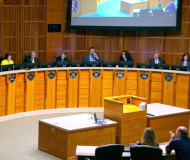Article from: www.thenewspaper.com/news/65/6507.asp
7/18/2018
Aurora, Colorado Voters To Decide Photo Radar Fate
Ballot measure asks residents in Aurora, Colorado whether they want the red light camera program to continue.
 Voters in Aurora, Colorado, will head to the ballot box on November 6 to decide whether the use of red light cameras should come to an end. The city council last month voted 9 to 1 to hand the ultimate decision to the public in a referendum inroduced by the new mayor, Bob LeGare. His language puts the question simply to the electorate.
Voters in Aurora, Colorado, will head to the ballot box on November 6 to decide whether the use of red light cameras should come to an end. The city council last month voted 9 to 1 to hand the ultimate decision to the public in a referendum inroduced by the new mayor, Bob LeGare. His language puts the question simply to the electorate.
"Shall Aurora continue to issue photo red light tickets to drivers that enter an intersection after the traffic light turns red?" the ballot question asks.
Unlike a handful of city council-led efforts asking for voter input on photo enforcement, this measure is not merely advisory. If voters endorse the "No" position, the referendum includes a clause that removes authorization for camera usage from the city code.
"All resolutions or parts of resolutions of the city in conflict herewith are expressly repealed," the measure states.
The automated ticketing machines run by Conduent (formerly Xerox) have continued operating in Aurora under a temporary contract extension. So far, the program has generated $2,464,157 in revenue, but the safety benefits that camera proponents promised have failed to materialize. The city's own data show crashes involving rear-end collisions and T-bones near the cameras increased 25 percent over the last five years of red light camera usage. Injury accidents increased 188 percent.
"There's been a lot of controversy over the years," LeGare said in last month's council meeting. "I understand the city of Denver was issuing photo red lights if your bumper crossed the line after you stopped, and if you didn't stop before the line."
If voters opt to retain the use of cameras, Aurora police officials told the council that they could expand the camera system to take advantage of new technologies that enable tracking of not just cars, but also pedestrians based on their visual characteristics.
"4K resolution and one teraflop of processing power brings real-time identification, classified, with searchable metadata for objects based on type, color, location, date, and time," the police presentation explained.
The odds are against such an expansion ever happening. Voters in Arizona, California, Illinois, Louisiana, Maryland, Missouri, New Jersey, New Mexico, Ohio, Texas and Washington have cast ballots on the use of automated ticketing machines in 40 electoral contests (view list). Cameras have lost all but four times.
 Voters in Aurora, Colorado, will head to the ballot box on November 6 to decide whether the use of red light cameras should come to an end. The city council last month voted 9 to 1 to hand the ultimate decision to the public in a referendum inroduced by the new mayor, Bob LeGare. His language puts the question simply to the electorate.
Voters in Aurora, Colorado, will head to the ballot box on November 6 to decide whether the use of red light cameras should come to an end. The city council last month voted 9 to 1 to hand the ultimate decision to the public in a referendum inroduced by the new mayor, Bob LeGare. His language puts the question simply to the electorate.